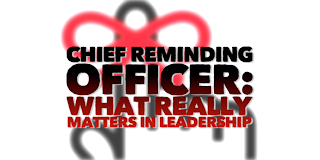'Being responsible is not forgetting!' I have said that to my children 1000 times. There were times when they were toddlers that I felt like all I did was remind them of things, and then remind them of my definition of being responsible. Being responsible is not forgetting. I was under the misguided assumption that as they aged, I would have to remind them about things less. That assumption has proven incorrect. The only thing that has changed is that the consequences of forgetting have intensified. What was once, 'don't forget to clean up your toys' is now 'don't forget to register for your classes.'
I am not much better at remembering things. I've just become more savvy at how to accommodate for my forgetfulness. Like many of you reading this, I have a variety of apps, alerts, legal pads, and post-it-notes to help me remember. My favorite trick, stolen from my grandfather, is putting my car keys in the fridge. The next time you have something important to remember to do or take with you when you leave the house, put your car keys in the fridge at that moment. When it is time to leave the house, you will pause and you will have this conversation with yourself;
'Where are my keys??'
'Oh, that's right. I put them in the fridge.'
'Why did I put them in the fridge??'
'Oh, that's right - that important thing I had to remember!'
We forget things all the time. We even forget important things we cannot believe we ever forgot. I am embarrassed to say there are times when I've been so busy I have forgotten to be a good husband, or a caring father. In fact, I would suggest remembering the most important things is the hardest thing to do in the midst of living life.
Leaders have the responsibility to help their people remember the most important things. It takes discipline. It takes composure. It takes forward thinking. Why? Life gets busy and we forget what really matters. We forget our 'why'. Patrick Lencioni, business leadership guru, calls leaders Chief Reminding Officers (CROs). Who needs to be a CRO? Who needs to remind the people around them of the most important things; the whys? Here are a couple CROs that come to my mind: spouses, parents, pastors, managers, coaches, teachers, principals, executives, and anyone else that influences people.
I love being a CRO. I have often told the people I lead 'when you have a big vision, the small work matters.' The most intense version of work is the version that keeps the 'why' right between your eyes while you are working. Here are a few suggestions on how to be a great CRO so the people around you can produce at a level that makes them proud of what they are doing...
The importance of reps - I was a basketball player throughout high school and college. One of the things I valued most was being in a gym by myself getting reps. Shooting the ball over and over again was the only way to get good at shooting the ball. Marshall Goldsmith in his books, What Got You Here Won't Get You There', says you cannot assume that people heard you the first, second, or third time. CRO's communicate what is important relentlessly.
Speak it into existence - I approached the lead pastor of a thriving church, and asked him how he had developed such a diverse congregation. 'I just kind of spoke it into existence. When a leader talks about something all the time, people have a way of embracing it and making it true.' I am sure it was more complex than that, but I think it is also that simple. If a CRO wants something to be important, they should never underestimate the power of their voice to bring it into existence.
Point it out when it happens - It is a truth of leadership that what gets recognized gets repeated. If a CRO wants the important things to be important to everyone they must keep their radar on for when it is happening, and then point it out to everyone. Let's say for example that selflessness is a core character trait for an organization and an employee gives a personal day to another a co-worker so they can have the additional time necessary to deal with a family tragedy. A CRO looking to make selflessness the norm at their organization should point out the selfless act for all to see. In a short time, more acts of selflessness will be performed because what gets recognized gets repeated.
Weave it into every communication - I make it a personal point to never address an audience in my organization without weaving in the mission. This includes emails, in person presentations, Zoom calls, and social media posts. Opportunities to communicate what is important should never be wasted and every time a leader has a chance to address a group is an opportunity. A CRO knows every platform of communication is a platform to remind people of what really matters.
*Bonus: Here are some books to read on the importance of being a CRO. Visioneering by Andy Stanley, The Advantage by Patrick Lencioni, and Hand Me Another Brick by Charles Swindoll
Keep on, keepin' on, friends!
‘Bite Down and Don’t Let Go’ is a collection of writings on being intentional about life in a way that produces great persistence. Read about it more here.


Comments
Post a Comment